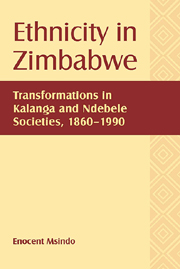Book contents
- Frontmatter
- Contents
- List of Illustrations
- Acknowledgments
- List of Abbreviations
- Note to the Reader
- Introduction
- 1 Ethnicity and Identities in Matabeleland
- 2 Domination and Resistance: Precolonial Ndebele and Kalanga Relations, 1860–93
- 3 Remaking Communities on the Margins: Chieftaincy and Ethnicity in Bulilima-Mangwe, 1893 to the 1950s
- 4 Ultraroyalism, King's Cattle, and Postconquest Politics among the Ndebele, 1893 to the 1940s
- 5 Language and Ethnicity in Matabeleland
- 6 Contests and Identities in Town: Bulawayo before 1960
- 7 Complementary or Competing? Ethnicity and Nationalism in Matabeleland, 1950–79
- 8 Postcolonial Terror: Politics, Violence, and Identity, 1980–90
- Conclusion
- Notes
- Selected Bibliography
- Index
- Rochester Studies in African History and the Diaspora
2 - Domination and Resistance: Precolonial Ndebele and Kalanga Relations, 1860–93
Published online by Cambridge University Press: 05 February 2013
- Frontmatter
- Contents
- List of Illustrations
- Acknowledgments
- List of Abbreviations
- Note to the Reader
- Introduction
- 1 Ethnicity and Identities in Matabeleland
- 2 Domination and Resistance: Precolonial Ndebele and Kalanga Relations, 1860–93
- 3 Remaking Communities on the Margins: Chieftaincy and Ethnicity in Bulilima-Mangwe, 1893 to the 1950s
- 4 Ultraroyalism, King's Cattle, and Postconquest Politics among the Ndebele, 1893 to the 1940s
- 5 Language and Ethnicity in Matabeleland
- 6 Contests and Identities in Town: Bulawayo before 1960
- 7 Complementary or Competing? Ethnicity and Nationalism in Matabeleland, 1950–79
- 8 Postcolonial Terror: Politics, Violence, and Identity, 1980–90
- Conclusion
- Notes
- Selected Bibliography
- Index
- Rochester Studies in African History and the Diaspora
Summary
Conquest, Social Engineering, and Kalanga Responses
The growing historiography of ethnicity has led to considerable shifts in scholarship from the mainly instrumentalist invention of ethnicity thesis, which was popular before the 1990s, to the notion of ethnic communities as imagined communities (post-1990s), which emphasizes the fact that ideologies and traditions constantly shift and take on new meanings once they are constructed. These changes have led some scholars to recognize precolonial origins of ethnicity.
With the exception of a recent work by MacGonagle on Ndau identity in Zimbabwe and Mozambique, Zimbabwean social historians like Ranger, Alexander, and a few others who have mainly written on colonial and postcolonial Zimbabwe have yet to accept that precolonial Zimbabweans had ethnic identities. Most historians of precolonial Zimbabwe have generally concerned themselves with aspects of African political and military history and paid little regard to the social and ideological bases underpinning those societies, including ethnic identities. In denying precolonial ethnicity among the Ndebele, Ranger suggested that the construction of a narrow Ndebele ethnicity began in the colonial era. Although Ranger believes that precolonial Africans had multiple identities, chiefly political and clannish, he does neglect the wider ethnic arena in which these identities were located.
In this chapter, I will argue that the nature of Ndebele and Kalanga relations left many Kalanga communities with little choice except to reorganize themselves into stronger political entities that found their expression in developing a shared sense of Kalanga ethnicity.
- Type
- Chapter
- Information
- Ethnicity in ZimbabweTransformations in Kalanga and Ndebele Societies, 1860-1990, pp. 30 - 64Publisher: Boydell & BrewerPrint publication year: 2012



